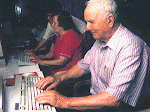 |
| A woman, resistant to even the most advanced daily affirmations, shown here desperately eating a salad and cackling madly into the void |
"Simple positive statements, even when said or heard on a daily basis, just aren't cutting it anymore," American College of Life Coaching (ACLC) certified coach Angina Wallmarsh explained. "I can tell some people that they deserve happiness, or that they are good enough, over and over and...nothing. No shift in mindset. No reduction in negative feelings. I mean there is just no response, and it scares the crap out of me."
Affirmations are simple and positive phrases used to help challenge negative thoughts and increase motivation to make positive life changes. The first affirmation was discovered by accident in 1963 when a Manhattan psychotherapist noticed an unusual increase in a client's self-esteem after being told that she had a nice face and could definitely score herself a man if she just lost a few pounds in some places and maybe put a few on in others. The rest is history.
This crude and rudimentary first effort opened the door to a revolution in positive psychology. Affirmations were quickly refined and gained widespread popularity because of their immediate positive impact. After nearly two decades, however, the first reports in the literature of decreased effectiveness in some people emerged. This was counteracted at first by increasing the exposure to an affirmation through simple repetition.
Daily repetition was a powerful advance in the practice, and it did more than simply account for the relatively minor development of affirmation resistance seen in the 1980s. In the early 1990s, in fact, it seemed as if there was nothing that couldn't be accomplished through the incorporation of a few of these powerful phrases into our daily routines. But by the end of the decade, therapists and life coaches were starting to see people resorting to telling themselves the same affirmations hundreds of times each week to avoid getting caught up in negative self-talk and to restore more adaptive personal narratives.
The new study looking into decreasing effectiveness of affirmations, published this week in Online Publishing Module #792 - Positive Psychology is Amazing And So Are You!, reports the first cases of complete resistance. Wallmarsh, who once stood in line behind Reese Witherspoon at a Michael's Craft Store in Nashville, remains optimistic. "Moving forward, we will just need to focus on inspirational self-talk that is even broader in scope and much more emotionally significant. We can do this."
In response to the study, the ACLC has published a guide for coaches and the public that includes some examples of potential affirmations for use supporting anyone developing affirmation resistance:
1. I am the light that illuminates all existence.
2. My life is a beacon of hope for all, a lighthouse that guides the cosmos through the chaos of the void.
3. Join my being and be consumed in the fire of my womanly kiln.
4. I am prophesy made flesh, the final form of the inevitable.
5. I am like Oprah, but on a multidimensional scale where, quite literally, everybody gets a car.

1 comment:
Love that photo caption.
Post a Comment